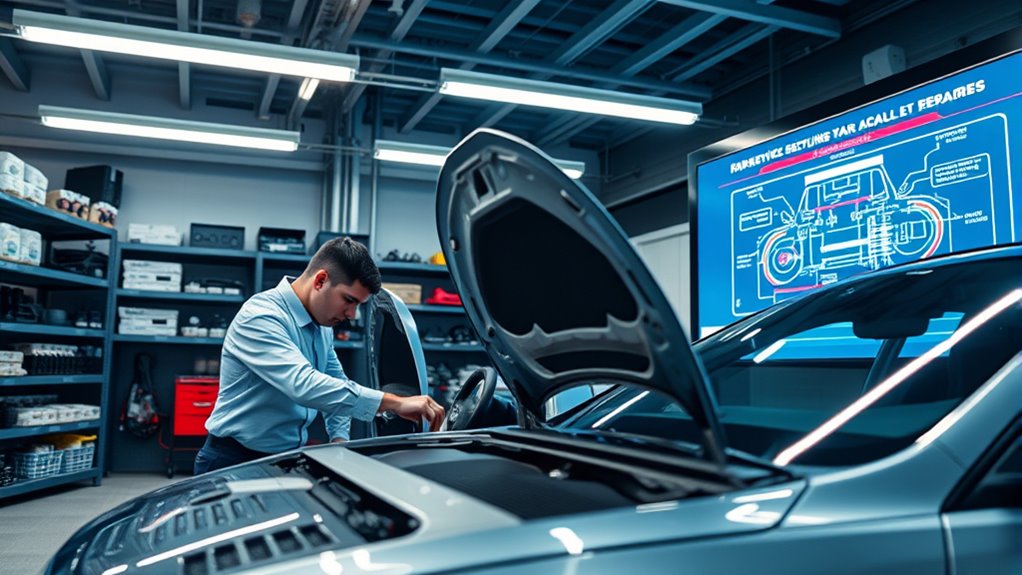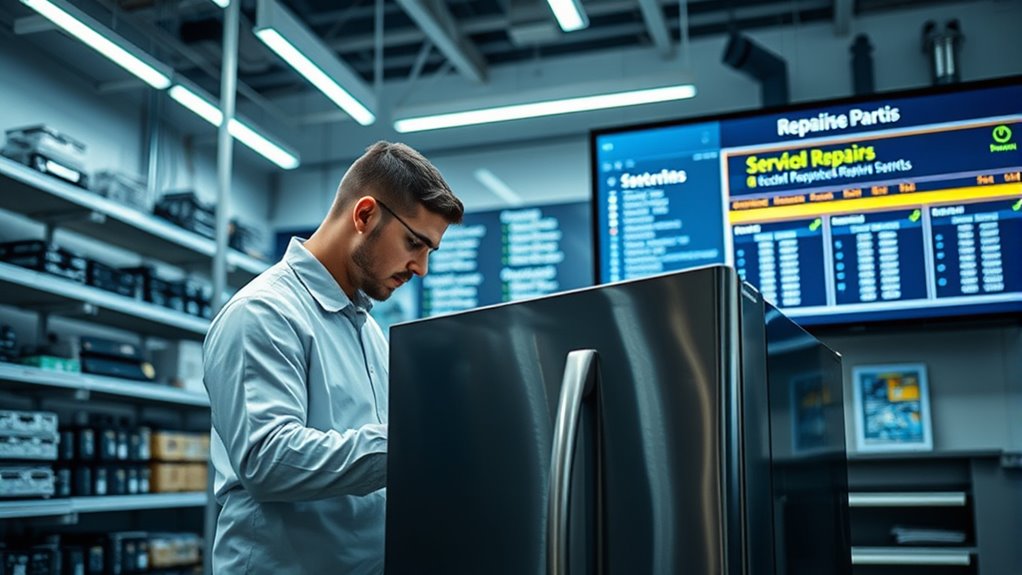With a service plan, recall repairs are handled smoothly and at no extra cost to you. Your manufacturer typically notifies you about recalls, and authorized service centers perform the repairs free of charge, following safety standards. The plan guarantees your vehicle stays up-to-date on recalls, so safety isn’t compromised. If you want to understand how these processes protect you and what to expect, keep exploring more details.
Key Takeaways
- Service plans often include coverage for recall repairs at authorized repair centers.
- They facilitate prompt notification and scheduling of recall repairs for vehicle owners.
- Recall repairs under service plans are typically performed free of charge, aligning with manufacturer warranties.
- Service plans ensure repairs meet safety standards and legal requirements during recall processes.
- They provide a structured process that helps vehicle owners manage recall repairs efficiently and confidently.

When it comes to maintaining your vehicle, understanding service plans and recall repairs is essential. These plans often provide a clear path for handling unexpected issues that might arise during your car’s lifespan. One of the key aspects of this process involves knowing how warranty coverage works and what manufacturer responsibilities are in the event of a recall. Service plans typically include warranty coverage that protects you from costly repairs for a specified period or mileage. This coverage is designed to ensure that manufacturers take responsibility for fixing certain defects or issues that appear after purchase, giving you peace of mind.
Recall repairs are a critical part of vehicle safety and compliance. When a manufacturer discovers a defect that could impact safety, they are legally responsible for addressing it. This is where manufacturer responsibilities come into play. They must notify vehicle owners about recall campaigns and provide free repairs, often at authorized service centers. These repairs are usually covered under the original warranty or recall-specific provisions, meaning you won’t have to pay out of pocket. Service plans often streamline this process, ensuring that you’re informed promptly and that the repairs are handled efficiently. Additionally, understanding the process of recall management can help you stay proactive about vehicle safety issues.
Recall repairs ensure safety and are covered under warranty, with manufacturers responsible for timely, free fixes at authorized centers.
Your service plan may include specific clauses about recall repairs, detailing how they’re processed and what steps you need to take. Typically, you’ll receive notifications from your manufacturer or dealership if a recall affects your vehicle. Once you bring your car in for the repair, the service center will verify the recall and carry out the necessary work at no cost to you. This process underscores the manufacturer’s responsibilities to ensure safety and compliance, which are legally mandated. It’s essential to keep track of any recall notices and follow through with the recommended repairs, as ignoring them can compromise your safety and lead to more costly repairs down the line.
Understanding how service plans handle recall repairs also involves knowing that manufacturers are held accountable for addressing these issues within specified timelines. They’re responsible for providing parts, labor, and ensuring the repairs meet safety standards. If a recall repair is needed, your service plan usually ensures that the process is straightforward, with minimal inconvenience. In some cases, extended service plans or warranties may also cover additional costs or provide priority scheduling for recall-related fixes. Ultimately, knowing your rights and the manufacturer’s obligations helps you navigate recall repairs confidently, ensuring your vehicle remains safe, reliable, and well-maintained throughout its lifespan.
Frequently Asked Questions
Are Recall Repairs Covered Under All Service Plans?
Recall repairs are typically covered under most service plans, but it’s essential to verify your specific plan’s coverage. When a recall occurs, the manufacturer initiates the recall process and schedules repairs. Your service plan often covers the cost, making the repair process smoother. You’ll need to follow repair scheduling instructions provided by the plan or manufacturer to ensure your vehicle gets the necessary recall repairs promptly.
How Long Do Recall Repairs Typically Take?
Ever wonder how long a recall repair might take? It generally depends on factors like recall appointment scheduling and parts availability. Repairs can range from a few hours to several days, especially if parts need to be ordered. To minimize downtime, schedule your appointment early and stay in touch with your service provider. Being proactive helps guarantee your vehicle gets fixed promptly, so you’re back on the road faster.
Do Recall Repairs Affect My Warranty Coverage?
Recall repairs generally don’t impact your warranty coverage because they are part of the recall process, which is mandated by safety regulations. However, warranty exclusions may apply if the issue isn’t related to the recall or if your service plan has specific limitations. It’s best to review your warranty terms and consult with the manufacturer or dealer to ascertain your recall repair is covered without affecting your warranty.
Can I Choose Any Authorized Service Center for Recall Repairs?
Think of your recall appointment as a key opening peace of mind. You can’t just choose any authorized location; it has to be an approved service center to guarantee proper repairs. Always schedule your recall repair at an authorized location to assure your vehicle’s safety and maintain warranty coverage. Trust that these authorized centers follow manufacturer standards, giving you confidence that your recall repair is handled correctly and efficiently.
Will I Have to Pay Anything for Recall Repairs Under My Plan?
You typically won’t have to pay anything for recall repairs under your service plan, as recalls are mandated by manufacturers and covered by them. During the recall process, your authorized service center prioritizes your repair to avoid delays. However, if additional issues are discovered unrelated to the recall, those might incur charges. Rest assured, your plan aims to minimize repair delays and ensure that recall repairs are handled promptly at no cost to you.
Conclusion
In the end, understanding how your service plan covers recall repairs can save you from a nightmare that feels like it’s never-ending. With the right plan, you’re protected against unexpected costs and hassle, making recall repairs feel like a minor hiccup instead of a catastrophic event. Remember, a good service plan isn’t just a safety net—it’s your shield against the chaos of unexpected vehicle issues. Stay informed, stay protected, and drive worry-free!









